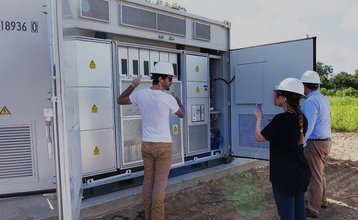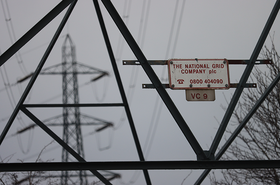Facebook owner Meta has helped set up a consortium to measure the emissions benefits of using large batteries for energy storage.
If energy utilities are to switch off their coal and gas fired generators, they have to invest in batteries and other storage systems to hold solar and wind energy till it is needed. The Energy Storage Solutions Consortium aims to develop a way to measure the greenhouse gas emissions benefits of energy storage, so utilities have solid reasons to invest in big batteries.
The consortium, also led by energy analytics firm REsurety, and storage and generation firm Broad Reach Power, says it will provide an open-source, third-party-verified methodology to quantify the GHG benefits of grid-connected energy storage projects, which organizations can use as a tool to create credible progress toward net zero emissions.
The methodology will be submitted to industry body Verra for approval under Verra's Verified Carbon Standard, and can then provide guidance on issues such as when and where to deploy stored energy to have the best emissions reduction effects.
This will be based on "locational marginal emissions," a concept from RESurety, which in essence argues that resources should be put into the most effective projects, based on their location and the benefits they deliver. The idea is to measure the tons of GHG emissions displaced through the charging and discharging of energy storage facilities on the grid at a specific location and point in time, and compare that with other projects.
“At Meta, we are committed to accelerating the transition to the carbon-free grid of the future, and large-scale energy storage is a critical part of that transition,” Peter Freed, director of energy strategy at Meta, said in a statement. “We are excited to launch this consortium in partnership with these industry-leading organizations, who will bring diverse perspectives and experience to the development of a robust, transparent methodology.”
“We need to decarbonize the grid as quickly as possible, and to do that we need to maximize the emissions impacts of all grid-connected technologies - whether generation, load, hybrid or standalone storage,” said Adam Reeve, SVP of software solutions at REsurety. “Energy storage is a technology that has huge potential, and we’re delighted to partner with industry leaders in this forward-thinking and collaborative effort to develop a global standard for energy storage benefits.”
“Battery storage will play an increasingly important role in delivering reliable and affordable power to homes and businesses as we move toward a 100 percent renewable energy grid. As the leading utility-scale battery storage platform in the US, we’re looking forward to working with other industry leaders to be able to quantify the important GHG reduction benefits of large-scale energy storage facilities and help organizations take climate action,” said Paul Choi, EVP of origination at Broad Reach Power.
Meta, REsurety, and Broad Reach Power are on the steering committee of the consortium. Other members include 3Degrees Group, Akamai Technologies, Clearloop, Equilibrium Energy, Fluence, General Motors, GlidePath Power Solutions, Habitat Energy, Hannon Armstrong, Jupiter Power, Longroad Energy, Marathon Capital, Microsoft, Primergy Solar, Quinbrook Infrastructure Partners, RES Group, Rivian, Rowan Digital Infrastructure, Stem, Tabors Caramanis Rudkevich, TimberRock, UBS Asset Management, and WattTime.




